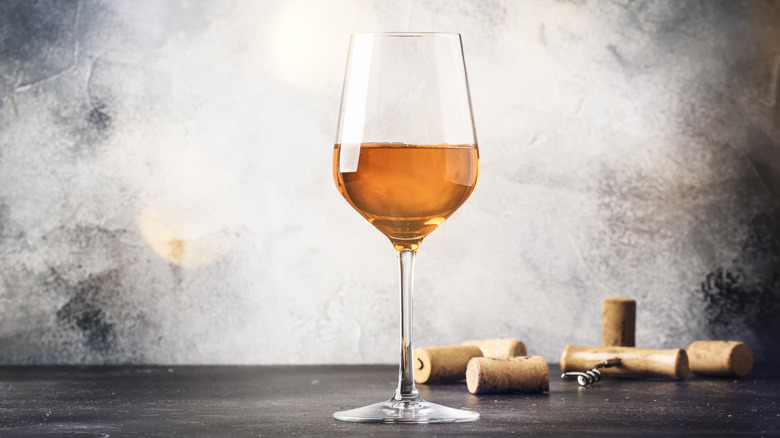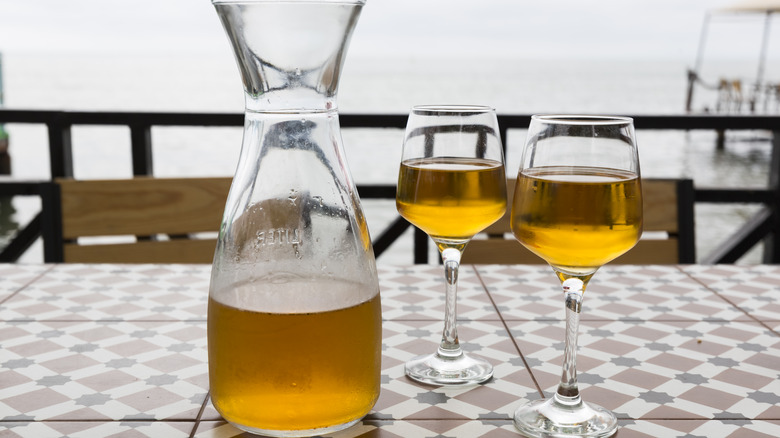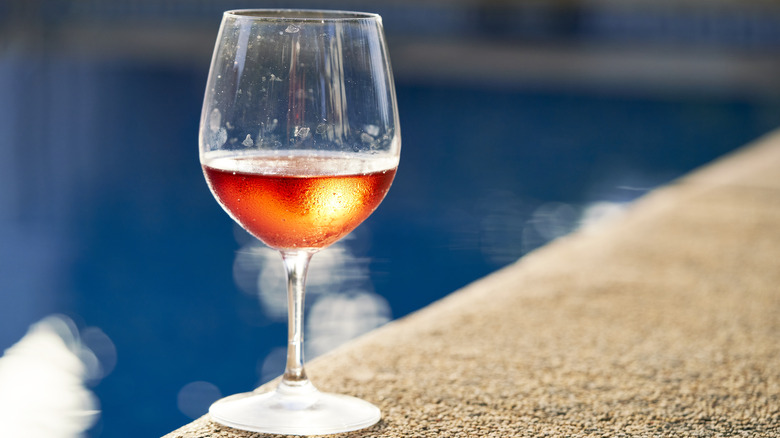An Expert's Guide To Pairing Food With Orange Wine
If you've never heard of orange wine, you're certainly not alone. In name recognition, it lags far behind red wine, white wine, and even rosé, but over the past year, sales of orange wine have been skyrocketing, and it's high time to get in on the trend. To start, we need to get one thing straight. Orange wine isn't made from oranges; the name refers to its color, and you can think of it like a bridge between red and white wine. That's because orange wine is made from white grapes, but unlike white wine, the grapes are fermented with their skins, bringing out the kind of wine tannins you'd expect from a glass of red.
For the ins and outs of orange wine, Chowhound spoke to Doreen Winkler, founder of Orange Glou, the world's only wine store and subscription service exclusively dedicated to orange wines. She believes that, "Orange wine is the most versatile style of wine, and its variety of expressions are dependent on the winemaker, the terroir, types of grapes used, and length of skin contact."
Winkler also explains that, while orange wine might seem like a new trend, it's actually a taste of ancient history that dates back thousands of years to the Republic of Georgia, which could be the birthplace of wine. So pour a glass of orange wine and enjoy a unique taste of history, and if you're wondering what to pair it with, don't worry, Winkler has you covered.
Still orange wines go with bold, savory flavors
One of the most convincing reasons to try orange wine is that it can be paired with foods that their red and white counterparts typically don't complement. This is particularly true of heavily-spiced dishes. Pairing wine with spicy food can pose a major challenge, but orange wine is a unique case due to the textural nature of its tannins. Doreen Winkler says, "It's such a great food pairing option, bringing out the best from vegetables, seafood, spicy Indian food, and so much more!" In addition to spicy dishes, it also pairs well with fermented, umami flavors, such as kimchi.
Winkler adds that "full-bodied orange wines like Radikon Ribolla Gialla work well with five-spiced duck," its savory notes and tannic texture enhancing the spice rather than clashing with it. For lighter-bodied orange wines, she recommends the funky flavor of goat cheese. Now, here's a way to take your next wine and cheese party to another level.
Sparkling orange wines can work with fried chicken
As with their still counterparts, sparkling orange wines are highly variable, and may be light or full-bodied. Generally speaking, lighter-bodied sparkling orange wines pair better with lighter foods. Doreen Winkler notes that "a light, floral, and mineral orange pét-nat is perfect for sushi, as the bubbles balance the wasabi and the minerality balances the saltiness of the fish and soy sauce." These wines also make a great pairing for savory snacks such as potato chips, pretzels, and wasabi peas.
More full-bodied sparkling orange wines pair best with rich foods because the bubbles are able to cut through some of that richness and lighten your palate. Winkler specifically recommends pairing full-bodied sparkling wines like an orange frizzante with fried chicken. Fried chicken isn't typically the kind of dish you think of when it comes to wine pairings, but as Winkler explains, "the ample bubbles cut through the richness of the fried chicken skin."
Orange wines aren't the best choice for dessert
Sweets are the one group of foods to which the versatility of orange wine does not extend, except in rare circumstances. Doreen Winkler explains that "due to their dry finish, orange wines don't always work well with desserts." The term "dry wine" simply means that the wine is allowed to ferment long enough that the yeast in it consumes all the natural sugars from the grapes. The tannins present in orange wine also counter sweet flavors, so in short, it can detract from the taste of the dessert.
Although Winkler doesn't necessarily recommend pairing orange wines with dessert, she says it's not entirely impossible: "If you really want to enjoy orange wine with something sweet, then try something fortified." Fortified wines, such as Port and Madeira, have been mixed with a distilled spirit, typically a grape-based liquor such as brandy or cognac. When it comes to pairings for sweet dishes, Winkler recommends "an orange wine vermouth." Vermouths can also be sweet or dry, so pay careful attention to which one you're getting.



